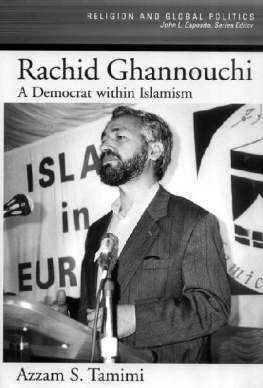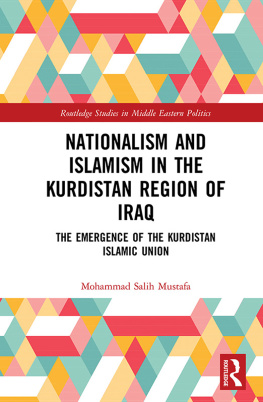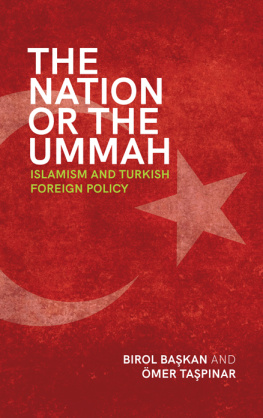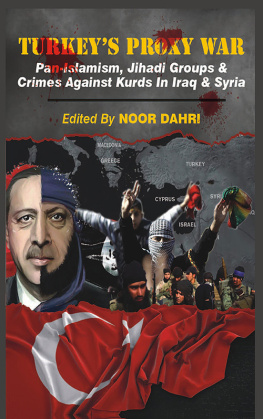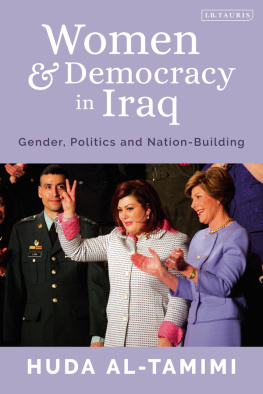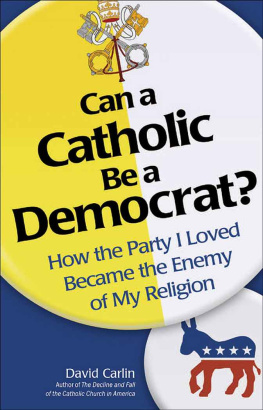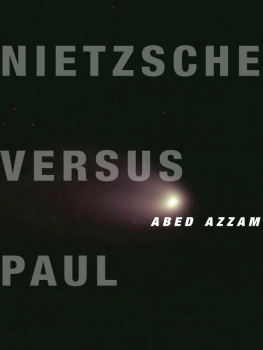Azzam S. Tamimi - Rachid Ghannouchi: A Democrat within Islamism
Here you can read online Azzam S. Tamimi - Rachid Ghannouchi: A Democrat within Islamism full text of the book (entire story) in english for free. Download pdf and epub, get meaning, cover and reviews about this ebook. year: 2001, publisher: Oxford University Press, genre: Detective and thriller. Description of the work, (preface) as well as reviews are available. Best literature library LitArk.com created for fans of good reading and offers a wide selection of genres:
Romance novel
Science fiction
Adventure
Detective
Science
History
Home and family
Prose
Art
Politics
Computer
Non-fiction
Religion
Business
Children
Humor
Choose a favorite category and find really read worthwhile books. Enjoy immersion in the world of imagination, feel the emotions of the characters or learn something new for yourself, make an fascinating discovery.
- Book:Rachid Ghannouchi: A Democrat within Islamism
- Author:
- Publisher:Oxford University Press
- Genre:
- Year:2001
- Rating:5 / 5
- Favourites:Add to favourites
- Your mark:
- 100
- 1
- 2
- 3
- 4
- 5
Rachid Ghannouchi: A Democrat within Islamism: summary, description and annotation
We offer to read an annotation, description, summary or preface (depends on what the author of the book "Rachid Ghannouchi: A Democrat within Islamism" wrote himself). If you haven't found the necessary information about the book — write in the comments, we will try to find it.
Rachid Ghannouchi: A Democrat within Islamism — read online for free the complete book (whole text) full work
Below is the text of the book, divided by pages. System saving the place of the last page read, allows you to conveniently read the book "Rachid Ghannouchi: A Democrat within Islamism" online for free, without having to search again every time where you left off. Put a bookmark, and you can go to the page where you finished reading at any time.
Font size:
Interval:
Bookmark:


Series Editor
John L. Esposito University Professor and Director Center for Muslim-Christian Understanding Georgetown University
The Islamic Leviathan State Power and Islam in Malaysia and Pakistan Seyyed Vali Reza Nasr
Rachid Ghannouchi A Democrat Within Islamism Azzam S. Tamimi

AZZAM S. TAMIMI
It was by virtue of my involvement in Liberty for the Muslim World, a London-based organization concerned with monitoring human rights and democratization in Muslim countries that I developed an interest in pursuing academically the issue of Islam and democracy. Like many Muslims, I had been greatly disappointed with the forcible termination of the democratic process in Algeria and was dismayed by the attempt in some circles to justify the January 1992 military coup as having been inevitable in order to protect democracy from its enemies, the Islamists. I embarked on this work believing democracy to be compatible with Islam and hoping to establish this compatibility by means of academic research.
The idea was to refute the conclusions by some renowned Muslim political writers that Islam and democracy did not work. I also was motivated to pursue this line of research by the democratic experiment in Jordan, where, despite a fully-fledged Islamist participation in the political process, there was still a debate within Islamic movement circles as to whether democracy did, or did not, contradict Islam. This debate had actually been going on in much of the Arab world since the mid-1980s when the breeze of democratization seemed to blow across the region. The most significant development accompanying this trend had been the emergence within political Islam of groups willing to take part in the democratic process and pledging to respect the results of the elections and to play by the rules of the game.
Researching this topic necessitated an exploration of the concept of democracy in Western literature, followed by an investigation of the position of various Islamic schools of thought on the subject. It is no secret that contemporary Islamic revival movements generally dislike ideas that originate in the West, in reaction to Western colonization of much of the Muslim world and out of fear of loss of identity under the hammer of modernization. Writers affiliated with the Sayyid Qutb school, which had the greatest influence on Arab Islamic movements from the mid-1960s through the 1970s to the mid-I980s, had insisted that democracy was an ideology alien to Islam. By the mid1980s this school started losing ground to another school of thought that maintained that democracy was not an ideology but a set of tools and mechanisms designed to control government power, which they considered to be perfectly compatible with the Islamic concepts of bay'ah and shura. To be fair, these ideas were not entirely new; they were espoused before by Afghani, Ahduh, Kawakibi, Rida, and Malik Bennabi long before the "incompatibility" school took hold.
The focus of my interest shifted slightly in the wake of the international symposium on Power-Sharing Islam, which was organized in London by the Centre for the Study of Democracy (CSD) at the University of Westminster and Liberty for the Muslim World on 20 February 1993. The symposium hosted a number of intellectuals and representatives of Islamic movements. Papers on Islam and democracy, the concept of powersharing and pluralism, and the experiences of the Islamic movements in Egypt, Jordan, Algeria, Malaysia, Yemen, and Kuwait were submitted.
Drawing on the symposium, I developed an interest in exploring the problems that faced Islamic movements as they participated in the process of democratization. I felt that investigating the attitude of Islamists vis-a-vis such problems would make a more interesting, and at the same time more challenging, topic of research. The idea was to show that recent democratization experiences in countries such as Jordan, Egypt, Tunisia, Algeria, and Yemen prove that serious obstacles confront the transition to democracy in these countries. As far as I could see, most of these obstacles emanated from outside the Islamic camp, mainly from local authoritarian governments and from global powers seeking to preserve the status quo. There are, however, obstacles emanating from within the Islamic camp itself caused by the emergence of radical trends within the phenomenon of Islamic revival that reject democracy and consider it a heresy imported from the West.
In the meantime I had been in contact with Rachid Ghannouchi, one of the most prominent thinkers in the realm of contemporary Islamic thought and the exiled leader of the Tunisian Islamic movement Ennahda. I developed an interest in Ghannouchi when I met him in London in February 1992, during which time I was asked to translate a paper submitted by him to a conference on Islam and Democracy in North Africa organized at the London School of Economics by its Islamic Society. Thereafter, whenever Ghannouchi was invited to give a talk or present a paper I was asked to interpret his talk or translate his paper. The talks and papers covered issues such as democracy, secularism, civil society, human rights, the nation-state, civil liberties, Islam and the West, the role and future of Islamic movements, Islamic minorities, and the political situation in Tunisia and North Africa.
Rachid Ghannouchi leads a school in modern Islamic political thought that advocates democracy and pluralism. He believes democracy to he a set of mechanisms for guaranteeing the sovereignty of the people and for supplying safety valves against corruption and the hegemonic monopoly of power. While insisting on the compatibility of democracy with Islam, he believes that because of their secular foundations, contemporary forms of liberal democracy may not suit Muslim societies. Ghannouchi's last and most important hook, AI-Hurriyyat al-'Ammah Fid-Daulah al-Islamiyyah (Public liberties in the Islamic state), has been an important contribution to the current debate within Islamic circles on the nature, duties, and restraints of government in Islam. Yet, although he has authored ten important books, very little of his thought has so far been made available to readers of English. Little has been written about Ghannouchi in English, and most of what has been written about him by academics happens to be part of a discussion of either the Tunisian Islamic movement or the question of Islam and democracy. Because I have translated many of the talks he has given and the papers he has written for English audiences since he settled in London, I therefore feel something of an authority on his political perspectives. I feel well placed to research the genealogy of his political thought and the way he perceives the process of democratization and the obstacles facing it in the Arab world, especially in the North African region.
Font size:
Interval:
Bookmark:
Similar books «Rachid Ghannouchi: A Democrat within Islamism»
Look at similar books to Rachid Ghannouchi: A Democrat within Islamism. We have selected literature similar in name and meaning in the hope of providing readers with more options to find new, interesting, not yet read works.
Discussion, reviews of the book Rachid Ghannouchi: A Democrat within Islamism and just readers' own opinions. Leave your comments, write what you think about the work, its meaning or the main characters. Specify what exactly you liked and what you didn't like, and why you think so.

